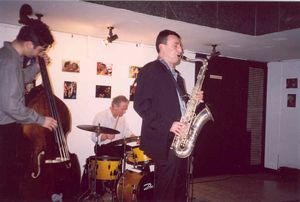Live Review - Dresch Quartet - Pizza Express Jazz Club. Dean Street, London. When Shu-Fang Wang first heard saxophonist Mihaly Dresch, she was impressed enough to fly to Hungary to see him play live. It turned out to be more than just a holiday romance. A couple of years on, she has put out Dresch's latest collection of tracks on her label November, and brought him over for a long-overdue UK debut. When Shu-Fang Wang first heard saxophonist Mihaly Dresch, she was impressed enough to fly to Hungary to see him play live. It turned out to be more than just a holiday romance. A couple of years on, she has put out Dresch's latest collection of tracks on her label November, and brought him over for a long-overdue UK debut. Wang has also helped to round up a band that hauls folk music squealing into the 2lst century. At Pizza Express, Dresch was reunited with his old collaborator Istvan Balo on drums, and the brilliant violinist and trumpeter Ferenc Kovacs. Matyas Szandai, on bass, is only 23 but is already possessed of fine-tuned, lightning fingers, while guest instrumentalist Balazs Unger is just 22. His cimbalom - a folk instrument resembling a piano but played like a vibraphone - was rescued from the Hungarian embassy last week, but under Unger's alternately delicate and ferocious mallets, zigzagging between musical territories of east and west, it didn't seem to have suffered from its prolonged hibernation. Poignancy and passion, innocence and experience these are contrasts integral to Dresch's writing. The first track, Serenity, lapsed into soft grooves as the drums sizzled and rolled like sea foam. That mood soon washed by and the pace picked up, the bass lolling into an irregular stride and Kovacs double-stopping low lines of melody on violin. The band moved into waltz, then swing, and then a trot before ending with another lull. Let's Go was fun, with the band building an immediate, rangy groove, ending with Balo spanking the drums as if disciplining a naughty child. Dresch's tone is often as bright as Garbarek's, but he lacks the latter's ethereality: his music is grounded, urgent, not transcendent, and possibly the more interesting for that. In a couple of the more atonal numbers, starbursts of melody, fairground jangles and trills on trumpet fluttered, tremulously cheerful but dangerously thin, over the bleak din of percussion and bass. We emerged into meadows of resolution; saw glimpses of joy, but soon the chase began again into dark thickets of sound. Tempo changes were rigorously precise, and when freneticism gave way to languor it was always with a slide rather than a lurch. Wang fell in love with Dresch's music because "it grew out of the earth, out of the land': The harvest may be on its way. Rachelle Thackray |
||||
|
